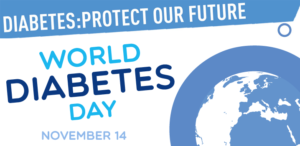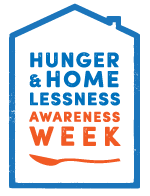 World Diabetes Day falls this year on Tuesday, November 14 — right in the middle of Hunger and Homelessness Awareness Week.
World Diabetes Day falls this year on Tuesday, November 14 — right in the middle of Hunger and Homelessness Awareness Week.
In recognition of this day, the National Coalition for the Homeless would like to start a conversation among healthcare providers, community members, and homeless advocates about how to help individuals who are facing illness and homelessness at the same time.
Consider the difficulty of managing a chronic illness like diabetes without the security of a home. The National Health Care for the Homeless Council (NHCHC) points out that, “[h]igh stress, unhealthy and dangerous environments, and an inability to control food intake often result in visits to emergency rooms and hospitalization which worsens overall health.”
Simply having a home decreases the likelihood that an individual will be exposed to extreme weather or unsanitary conditions. Housing provides greater security, improving both mental and physical health. If you’ve ever wondered why we promote slogans like “Housing is Healthcare,” this is why.
The NHCHC report goes on to point out that treatment is also more challenging without a home. In the case of diabetes, a report released by the Health Care for the Homeless Clinician’s Network noted that, “[h]ealthy meals can be hard to find, refrigerating insulin may be impossible, and medications for other illnesses may have a negative impact on metabolism.”
The report suggests several strategies physicians can use to help their homeless patients with diabetes to manage symptoms and maintain health as much as possible. However, these patients are already facing such disadvantages that the self-care strategies recommended in the report are less than ideal.
So what is there to do? Here are a few suggestions:
1) Encourage empathy among health care providers toward their homeless patients.
It can be easy for clinicians to have preconceived notions about homeless individuals. Homeless patients receive better care when their health care providers are able to set aside any negative assumptions and approach all patients with compassion. For example, one medical provider interviewed by researchers Elder & Tubb explained, “I had the preconceived notion that if you’re homeless, you don’t have a lot to do, but they have a lot to do—they’re applying for financial assistance, looking for housing, meeting with people, all those things require a lot of waiting and sitting around…”
2) Make sure homeless individuals are receiving health education, too.
The purpose of public health education is to prevent diseases before they happen. Government health offices, non-profit health education organizations, and other similar groups need to include the homeless community in their health promotion interventions.
3) Build continuity of support among homelessness service providers.
Service providers including case managers and social workers should be made aware of basic public health approaches to share with homeless individuals. For example, a housing case worker could take on the additional task of checking in with homeless clients about whether they are taking their prescribed medications or whether they have been able to consistently make it to doctors’ appointments.
There is so much more that can be done to support homeless community members who are dealing with illnesses like diabetes. On this World Diabetes Day, we want to hear from YOU about your creative ideas for how to better reach homeless individuals with the support and information they need to maintain good health. Join the conversation by following and tweeting to @ntl_homeless and @hhweek using hashtags #hhweek and #WDD.
Additionally, to learn more, consider registering for a Homelessness & Diabetes webinar being put on by the National Health Care for the Homeless Council on Thursday, 11/16, from 1-2pm CDT. Click here to register.
References
Elder, N.C. & Tubb, M.R. (2014). Diabetes in homeless persons: Barriers and enablers to health as perceived by patients, medical, and social service providers. Social Work in Public Health, 29(3): 220-231. DOI: 10.1080/19371918.2013.776391.
Kalinowski, A., Tinker, T., Wismer, B., & Meinbresse, M. (2013). “Adapting your practice: Treatment recommendations for patients who are homeless with diabetes mellitus.”
National Health Care for the Homeless Council. (2011). “Homelessness & health: What’s the connection?” Fact sheet.
